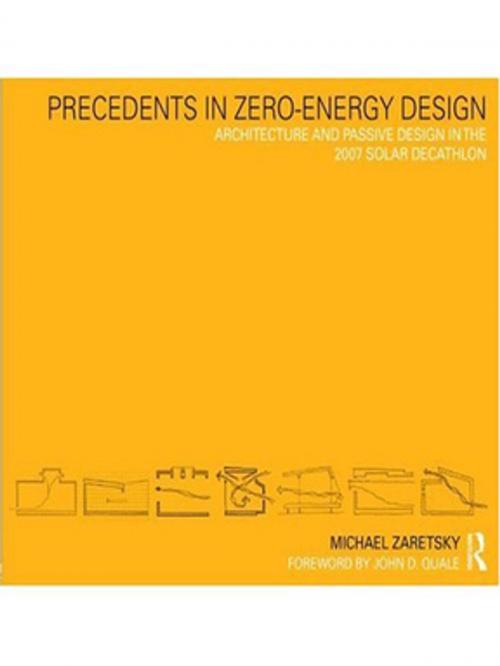Precedents in Zero-Energy Design
Architecture and Passive Design in the 2007 Solar Decathlon
Nonfiction, Art & Architecture, Architecture| Author: | Michael Zaretsky | ISBN: | 9781135234652 |
| Publisher: | Taylor and Francis | Publication: | October 15, 2009 |
| Imprint: | Routledge | Language: | English |
| Author: | Michael Zaretsky |
| ISBN: | 9781135234652 |
| Publisher: | Taylor and Francis |
| Publication: | October 15, 2009 |
| Imprint: | Routledge |
| Language: | English |
‘Michael Zaretsky’s Precedents in Zero-Energy Design is such an important book … it will help readers recognize that design comes before technology – and renewable energy systems alone can’t solve the problems we face’ – John D. Quale, Assistant Professor of Architecture and ecoMOD Project Director, University of Virginia
The world is currently facing an environmental crisis and as anyone interested in sustainable or zero-energy design knows the design and building industries have the potential to significantly reduce greenhouse gas emissions across the globe.
The Solar Decathlon is an international event in which universities from around the world compete in the design and construction of a one-bedroom, zero-energy house. This book provides an in-depth, yet accessible analysis of the architecture and passive design strategies of the houses in the 2007 Solar Decathlon. These houses are the result of thousands of hours of research and development from twenty universities around the world. Divided into three parts, the book provides:
- an initial section investigating the architecture, passive design and systems layout of the twenty houses;
- a diagrammatic comparison of the architecture and passive design characteristics of each of the twenty houses in order of ranking by the Architecture, Comfort Zone and overall scores received in the competition;
- a deep analysis of the relationship between architecture, passive design and mechanical systems design as compared to the rankings received in the various contests. This analysis considers the decisions made by the competing teams and highlights the success of the design strategies employed.
Students, educators, practitioners and researchers of architecture, design and engineering will find this an informative and inspirational book. It examines the relationship between design and environmental principles and provides invaluable insight into some of the most innovative, off-the-grid and zero-energy houses in the world.
With a Foreword by John D. Quale, Assistant Professor of Architecture and ecoMOD Project Director, University of Virginia
‘Michael Zaretsky’s Precedents in Zero-Energy Design is such an important book … it will help readers recognize that design comes before technology – and renewable energy systems alone can’t solve the problems we face’ – John D. Quale, Assistant Professor of Architecture and ecoMOD Project Director, University of Virginia
The world is currently facing an environmental crisis and as anyone interested in sustainable or zero-energy design knows the design and building industries have the potential to significantly reduce greenhouse gas emissions across the globe.
The Solar Decathlon is an international event in which universities from around the world compete in the design and construction of a one-bedroom, zero-energy house. This book provides an in-depth, yet accessible analysis of the architecture and passive design strategies of the houses in the 2007 Solar Decathlon. These houses are the result of thousands of hours of research and development from twenty universities around the world. Divided into three parts, the book provides:
- an initial section investigating the architecture, passive design and systems layout of the twenty houses;
- a diagrammatic comparison of the architecture and passive design characteristics of each of the twenty houses in order of ranking by the Architecture, Comfort Zone and overall scores received in the competition;
- a deep analysis of the relationship between architecture, passive design and mechanical systems design as compared to the rankings received in the various contests. This analysis considers the decisions made by the competing teams and highlights the success of the design strategies employed.
Students, educators, practitioners and researchers of architecture, design and engineering will find this an informative and inspirational book. It examines the relationship between design and environmental principles and provides invaluable insight into some of the most innovative, off-the-grid and zero-energy houses in the world.
With a Foreword by John D. Quale, Assistant Professor of Architecture and ecoMOD Project Director, University of Virginia















